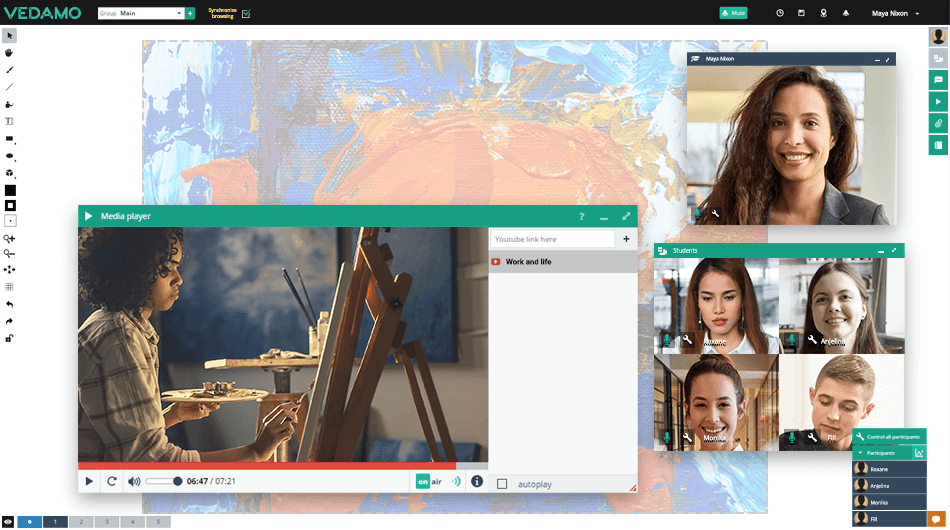For a teacher in a virtual classroom there are several things that are crucial to the creation of a nurturing atmosphere. Every lecturer should strive towards having a structured class with properly organized rules and rewards, as well as providing opportunities for participation and presenting the course in the best possible way. Incorporating the right strategies on these key points and optimizing the teaching process in the virtual classroom can determine the success or failure of a course. Students prioritize the work they do in accordance with the outcome they wish to achieve (grades, scholarships, respect, etc.).
The first step to building a solid foundation is to develop a stable teacher-student relationship in the virtual classroom. The second fundamental element is the method of teaching. There are several aspects that can make a huge difference in both the interest and motivation levels of students.
Clarity and structure
A teacher must create a clearly defined and well organized syllabus with a focus on specific learning goals. Defining what students are working towards is important for their motivation.
Challenging but achievable

When setting goals, the teacher should delineate specific activities and steps for the students to follow. They should be difficult enough to pose a challenge, but also easy enough and possible to achieve so that they will not discourage students.
Homework in advance
A common mistake that many teachers make is giving too much homework. They forget that students have other obligations and classes as well. A reasonable amount of difficult but achievable homework can be challenging and intriguing enough to keep pupils motivated. If the teacher has difficulties evaluating the precise quantity of work or the time it takes to complete it, a good option is to consult the students on the matter.
Providing a schedule with due dates for the tasks, as well as with exam dates, is another tip that may prove useful in the virtual classroom. It is particularly easy to implement since it can be created and shared online. Such a plan could help students better organize their time, thus enhancing their performance. It also creates the impression that the lecturer is an organized, punctual, fair, and disciplined person.

Opportunities for participation and feedback
In order to create a nurturing environment in the virtual classroom, it is important that the teacher interacts with their students. Students should feel that their opinion matters and be comfortable enough to give and receive feedback about their performance.
Participation
Participation creates student motivation. Moreover, it is an easy way to appraise and give constructive feedback on student performance. The received feedback could be applied to future tasks and could aid the process of building student confidence. However, it is important to note that practice opportunities should not necessarily involve grading. Other forms of evaluations include praise or social encouragement (like receiving positive attention from other students).
Freedom of choice
An effective way to enhance motivation in the virtual classroom is to allow pupils to select topics for papers and projects so that they can correlate their own interests to the subject. Besides creating greater motivation, this will serve to demonstrate the positive and practical applications of the knowledge that they are studying. Teachers must balance between giving too many options (which can be overwhelming) and not providing enough of a choice. A good idea is to present only a few options instead of a myriad of them. This way the feeling of the freedom of choice will still be present without the dread of demotivation.
Opportunities to revise study strategies
Students should revise their study strategies based on the way they have influenced their performance on previous tasks. It is useful to ask questions like:
- How did you prepare for this task?
- What skills did you implement?
- What do you need to work on to better cope with this kind of task?
- If you had to do it again, what would you change in the way you prepare?
- How long in advance did you begin?
- Did you revise before submitting the final version?
Besides indirectly hinting at possible directions for improvement, questions such as these can help students evaluate the outcomes of their effort. They can also assist them in identifying new ways of reinforcing their strengths and overcoming their weaknesses.
Significance, accountability, and rewards
Nothing increases student motivation more than to know that their efforts are meaningful and will bring future benefits. It is also important to have a proper evaluation and a corresponding reward.
Real-life application
To point out the importance of the course, teachers could use real-life cases as examples and tasks for practice (if appropriate). Working towards acquiring the needed skills is much more motivating than working for abstract goals.

Accountability
Pupils in the virtual classroom should be held accountable for their performance. This could be reflected in their grades or in the social factor (respect from their teacher, from their classmates, attention given to the student while speaking, etc.).
Criteria and rewards
It is crucial for lecturers to develop a system for rewards and to stick to it. Rewards must be commensurate with the work involved, otherwise students will have little motivation to try to excel. In addition, there should be a clear distinction between excellent and poor performance, as well as transparency about the behavior that the teacher expects them to follow. The teacher should decide if the course requires the students to take risks and whether or not to generate a number of original ideas at the expense of a lower quality end product. On the other hand, when teamwork is more important, the focus of the evaluation can be on communication skills and the interaction process.

In any case, “[…] it is important for instructors to clearly explain their grading criteria so that students can see the difference between levels of performance, assess their strengths and weaknesses in relation to those criteria, target specific areas for improvement, and trace a clear path from effort to valued outcomes.” Eberly Center. “Students Lack Interest or Motivation,” Carnegie Mellon University.
Presentation and examination
Relying only on the human voice while teaching is dangerous since it can have a hypnotic effect. Mixing various resources is a definite must in the virtual classroom. Using easily available and accessible videos, music, slideshows, etc. diversifies the content of the course and generates interest. Another important thing is to leave exams for the final part of the course. This way they will not become a source of great anxiety. Meanwhile, frequent low-stakes assignments can be very effective in motivating students to keep up with the learning process.
